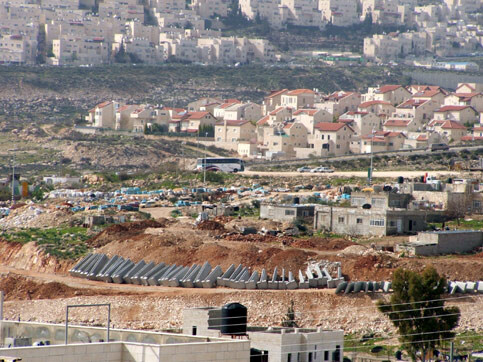Palestine Report 26 March 2005

The wall being constructed around the Israeli settlement Pisgat Ze’ev near Jerusalem (Photo: Maureen Clare Murphy)
This week Palestine Report Online interviews Orient House Mapping and Survey director Khalil Tufakji on the expansion of Jewish settlements in the West Bank.
PR: The Maaleh Adumim settlement bloc is the largest in the West Bank. What does the recent Israeli government decision to expand this bloc by 3,500 housing units mean for the Palestinians?
Tufakji: What is happening now in Maaleh Adumim is part of the plan recently proposed by Israeli Prime Minister Ariel Sharon, when he announced that settlement activity would be consolidated inside the West Bank after the disengagement plan [from the Gaza Strip]. Also, not long ago, he said the major settlement blocs would be annexed to Israel in the final stage.
The expansion of Maaleh Adumim is part of this plan, which is to create facts on the ground, to annex the settlement blocs to Israel and finally to alter the demographic reality to Israel’s advantage in terms of Jerusalem and basically impose a twofold reality on the Palestinians: the first is the geographical aspect and the second, the demographic aspect.
In addition, when Israel establishes 3,500 housing units in Maaleh Adumim in addition to thousands of housing units to the entire bloc, which is comprised of eight settlements - the biggest of which is Maaleh Adumim - this means there is an Israeli plan to sever the northern West Bank from the south.
PR: Whose lands will be confiscated in order for this expansion to occur?
Tufakji: The lands where expansion will occur were already confiscated in the 1970s and the 1980s and were declared “state lands” under Israeli law. When Palestinians from Al Tour and Anata appealed to the Israel High Court, their appeals were rejected.
PR: Do you agree with the idea that the disengagement plan is basically a means of consolidating West Bank settlements?
Tufakji: Definitely, especially after what Sharon announced last month about consolidating West Bank settlements. And now, what is happening on the ground and the declaration of the Israeli defense ministry about intensifying settlement activity in the West Bank proves this. On the ground, approximately 4,000 housing units were built last year alone. This is in addition to the increase in the number of settlers who moved to the West Bank, from 105,000 in 1992 to 236,000 at present.
In other words, any withdrawal from Gaza will be followed by an intensification of settlements in the West Bank. This is also a kind of bribe for the settlers: basically Israel is saying, “We will withdraw from the Gaza Strip but we will consolidate our settlements in the West Bank.”
PR: How is the fact that Maaleh Adumim effectively severs the West Bank into two parts going to affect any talk of an independent Palestinian state in the future?
Tufakji: First, let us be clear that this refers to the Maaleh Adumim bloc, which consists of eight large settlements. The area of this bloc is about 70 square kilometers with a population of over 30,000.
This settlement bloc is built to achieve three major goals: the first is to realize the Israeli concept of Greater Jerusalem, with an area exceeding 10 percent of the West Bank. The second is to make the city of Jerusalem the heart of the Jewish state. Third, it will create a narrow passageway that extends from the Tel Aviv coastline to the Jordan Valley. This passageway will become a buffer zone between the southern and northern West Bank. Therefore, any talk of a Palestinian state with geographic contiguity is nonsensical unless a road is built to join the two areas, but such a road will still be under Israeli control.
PR: How much does the separation wall hinder the establishment of this state?
Tufakji: First, no Palestinian state will be established. Sharon’s plan is as clear as day, indeed it dates back to 1983 when he was defense minister.
It stipulates the construction of the separation wall from the west along an eastern course, which includes the Elon Route 90 as well as Route 80, roads that were ratified in 1983 by military order. In other words, Sharon’s plan is to establish two parallel routes [of the wall]: one that extends from the north to the south and one that extends to the east. To the east of this route is the Jordan Valley, which will all be under Israeli control, and in the west is where all the settlement blocs are built with extensions reaching far into the West Bank, which will also be under Israeli control. In other words, the Ariel “extension” will be spread over 25 kilometers into the West Bank, severing the northern West Bank from the center.
Therefore, the establishment of a Palestinian state in terms of geographic contiguity can never happen. He used to say: two parallel lines and five vertical and any connection between them must be under Israeli control.
PR: So, on what basis can the Palestinian Authority negotiate with Israel?
Tufakji: Israel is creating facts on the ground where it comes to the settlements, Jerusalem and borders. As for what we should negotiate over? I think the Palestinian side is still weak in this regard - it is not even taking advantage of UN resolutions, statements by the EU, the American administration or the Quartet Committee in order to pressure Israel into halting these measures. Therefore, if we enter into negotiations over final status and these things have already been created on the ground, I think no Palestinian state will be established. We will return once again to Sharon’s project of cantons.

Related links:

